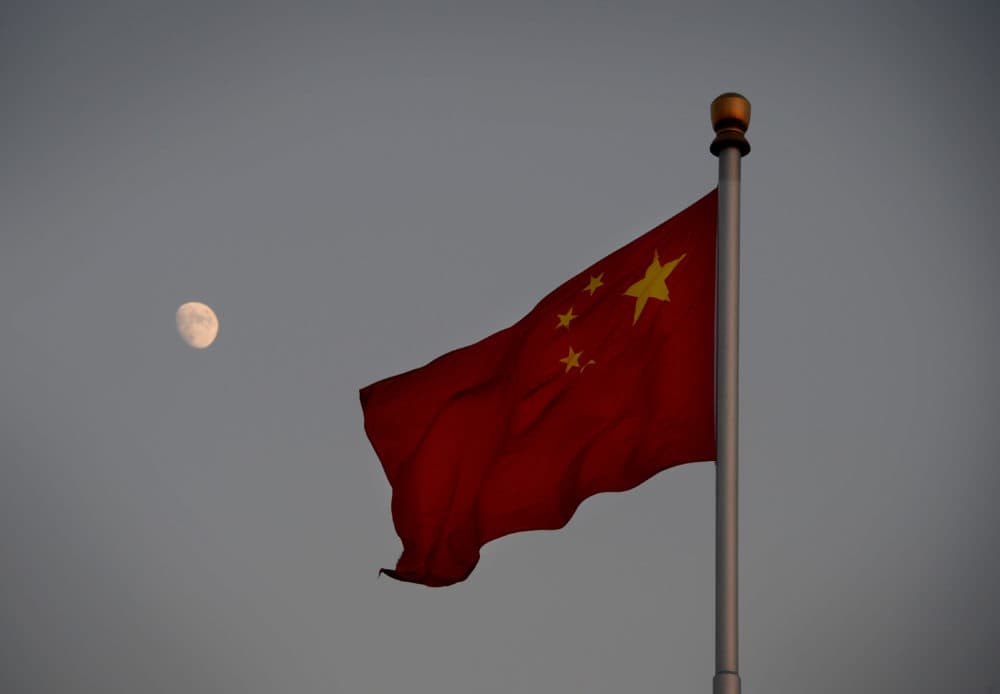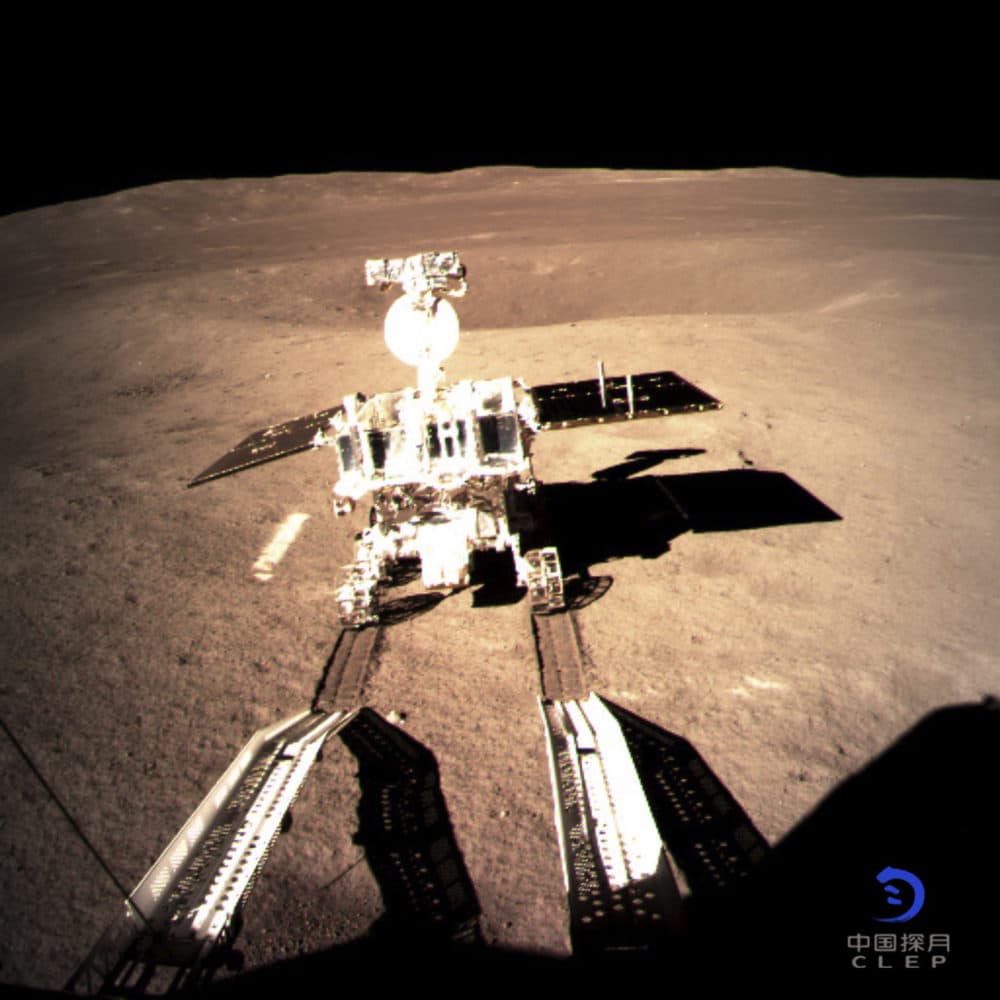Advertisement
China Wants To Establish A Base On The Moon, Space Program Expert Says
Resume
China recently completed the first-ever landing on the "dark" side of the moon. It was a technical achievement and a coup for the country's ambitions to outshine the U.S. space program.
Namrata Goswami, an expert on China's space program, tells Here & Now's Peter O'Dowd that its Chang'e-4 lunar probe has important implications for the future of space.
"It's a very, very symbolically and technologically significant development, and it shows to the world that China's space program has arrived and can do original feats on its own," says Goswami (@namygoswami), who's working on a book about "expansionism, territoriality and resource nationalism" in space.
China's long-term goal is to establish a base on the moon, which it can utilize for researching deep-space exploration and asteroid mining, Goswami says. That contrasts with U.S. goals, which are primarily focused on Mars.
Goswami says China's efforts in space come amid a loss of American momentum.
"In the last 20 years, the U.S. has lost focus — especially under the first two Bush administrations, and to an extent under Obama," she says. "Under President Xi Jinping, space is one of the top-most priorities of the Communist Party of China, and they have committed resources for the next 20 years."
Interview Highlights
On China's ambitions for a lunar base, and how it's trying to achieve that goal
"China views the moon as a base that it can utilize for research for deep-space exploration, to include asteroid mining and looking at further into the solar system. In their white papers, they have articulated their vision for looking at the moon not just by itself, but as a stepping stone to further their goals for becoming the only species on Earth to establish a human presence on the moon.
" ... In fact, if you look at what they have done on Earth last year, in Beihang University in Beijing, they have generated a simulated, lunar-like surface, where they have had students live in that condition for about 365 days. So the long-term ambition is to .. view the moon as an industrial base that's going to enable China further on to explore deep space, to include asteroid mining."
"For China, they have Mars, but that's the next-term goal. The first is the moon. And I think that's a much ... smarter strategy."
Namrata Goswami
On China's approach to Mars and how it contrasts with U.S. strategy
"China has announced a program ... by 2035, building on their capacity for the moon, they're looking at sending a robotic probe to Mars, and also, very interestingly, two robotic probes to the poles of the moon. In terms of that program, I think what China is doing is very different from what NASA or the U.S. is focusing on. So as you know, today, for the U.S. space community including NASA, Mars is a significant concern — how do you go to Mars, how do you ensure humans going to Mars, how to develop the technology.
"For China, they have Mars, but that's the next-term goal. The first is the moon. And I think that's a much ... smarter strategy, because if you develop capacity to be on the moon, that gives you a very cost-effective ability to then go and explore Mars, which is also going to be much, much cheaper."
On the extent to which competition with China is driving the Trump administration to push for a Space Force
"I think it's one of the fundamental reasons, because if you look at the debate that preceded the Space Force creation, you had Alabama Rep. Mike Rogers, you have the representative from Tennessee, Jim Cooper, who argued that what China is doing in terms of ... technology, in terms of aligning its military to look at space as an area of focus since 2015, has resulted in American space assets being vulnerable.
"I say this with a measure of seriousness, because if you look at the U.S. military, it's extremely dependent on space for GPS, for precision-guided missiles for its nuclear submarines. So if China can hold those particular assets vulnerable based on the capacity it's building, that can create some kind of fear in terms of the U.S. military's ability to engage in the Asia-Pacific and the role it has in the world. I think the establishment of a Space Force that is able to bring together different agencies of the government into a single administrative unit is actually quite needed."

On advantages China holds over the U.S. when it comes to executing space exploration
"Unlike in the U.S., where you have a change of regime every four years or every eight years, also you need congressional approval, which sometimes do not come forward. And so I think that's a clear advantage that China has in terms of space."
On whether militarization is an explicit part of what China is doing in space
"China is viewing space more as a geography, as a place where they can establish presence, especially for maintaining access and dominance. I find this exciting, but I also have reasons for concern. If you look at how China behaves when it establishes first presence — for instance in the South China Sea, or for instance in Tibet — I fear that if China establishes presence, that will lead to access that it would then claim as an entitlement as it has done here on Earth. So I fear that if we do not have an international regulatory system in place, it could lead to China claiming first-presence rights."
On competition between the U.S. and China ultimately being a good thing
"I think the competition is good, because for one, it encourages other nations to look at both countries' capability and capacity. ... So yeah the competition is good in terms of the innovation that it's going to encourage. For instance, you know that the GPS system was also a part of that competition with the Soviet Union [in the 1980s], and came out of the military and [the Defense Advanced Research Projects Agency]. China's ambitions have been articulated very clearly, and that is to establish publish humanity's first base [on the moon], for industrialization, for presence. I think China has very successfully changed the discourse on space by articulating those ambitions very clearly."
Chris Bentley produced and edited this interview for broadcast. Jack Mitchell adapted it for the web.
Correction: An earlier version of this segment incorrectly stated that NASA's manned space flight program has been canceled. In fact, NASA's manned space shuttle program ended in 2011, but the agency still has plans to put humans on the moon. Also, Goswami incorrectly stated that India's space program has sent a rover to Mars. In fact, the country has sent an orbiter to Mars. Its Mangalyaan 2 mission to Mars has a rover, but it has been delayed.
This article was originally published on January 04, 2019.
This segment aired on January 4, 2019.
